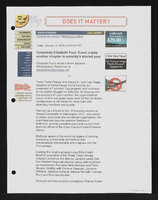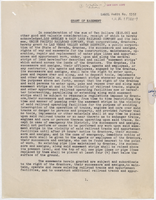Search the Special Collections and Archives Portal
Search Results
Sasha Semenoff oral history interview
Identifier
Abstract
Oral history interview with Sasha Semenoff conducted by Claytee D. White on April 29, 2009 for the Boyer Early Las Vegas Oral History Project. Semenoff begins the interview by discussing his early life in Latvia and learning to play the violin as a child before the Nazi invasion. He describes being a Jewish Holocaust survivor, surviving the ghettos and concentration camp where he was held, and explaining how he immigrated to the United States after he was liberated. Semenoff then discusses moving to New York City, New York, where he joined the musician's union before moving to Las Vegas, Nevada in 1959. He details his career as a prominent lounge and big band violinist in Las Vegas, where he played at several different casinos, including the Desert Inn Lounge, the Dunes Hotel and Casino, and the MGM Grand Hotel. Semenoff also talks about the musicians he has played with, such as Frank Sinatra and Dean Martin, his work at the time of the interview, and the presence of organized crime in Las Vegas.
Archival Collection

Alpha Kappa Alpha Sorority, Theta Theta Omega Chapter Founders' Day article and committee report
Date
Archival Collection
Description
From the Alpha Kappa Alpha Sorority, Incorporated, Theta Theta Omega Chapter Records (MS-01014) -- Chapter records file.
Text

Grant of easement, Las Vegas Land and Water Company, Audit No. 5352, June 1, 1954
Date
Archival Collection
Description
Granting of an easement by the Union Pacific Railroad to the Las Vegas Valley Water District for the purpose of maintaining the water supply facilities. Notarized by Louis Scholnick in Douglas County, Nebraska on June 3, 1954.
Text

Alpha Kappa Alpha Sorority, Theta Theta Omega Chapter Mardi Gras Ball fliers and newspaper article
Date
Archival Collection
Description
From the Alpha Kappa Alpha Sorority, Incorporated, Theta Theta Omega Chapter Records (MS-01014) -- Chapter records file.
Text
Remembering 1 October: A Night Of Healing And Community panelist event
Identifier
Abstract
Oral history panelist event with David Becker, John Fudenberg, Dr. Deborah Kuhls, Jay Pleggenkuhle, and Joy Rineer conducted by Claytee D. White on October 5, 2018 for the Remembering 1 October Oral History Project. This panel event took place at the University of Nevada, Las Vegas (UNLV) Lied Library to mark the one year anniversary of the 1 October shooting. Panelists include photojournalists present at the shooting, police officers responding to the shooting, trauma doctors handling the victims and their many injuries, and community members who helped initiate and create the Las Vegas Community Healing Garden.
Archival Collection

Alpha Kappa Alpha Sorority, Theta Theta Omega Chapter "Hodegos" reports
Date
Archival Collection
Description
From the Alpha Kappa Alpha Sorority, Incorporated, Theta Theta Omega Chapter Records (MS-01014) -- Chapter records file.
Text
Ida Webb oral history interview
Identifier
Abstract
Oral history interview with Ida Webb conducted by Claytee D. White on February 29, 1996 for the African Americans in Las Vegas: a Collaborative Oral History Project. In this interview, Webb discusses her childhood in the American South. She discusses her family's move from Tallulah, Louisiana to McNary, Arizona, and then their migration to Las Vegas, Nevada. Webb shares her experiences as a young African American mother in Las Vegas in the 1940s and the things her and her husband did to provide for their family. She shares her views on her marriage and her views on African American culture of the time. Webb discusses her husband's civic involvement and his job at the Las Vegas Sun. She details her experiences working in the hospitality industry for such early casinos as the El Rancho Hotel & Casino, The Flamingo Hotel & Casino, and the Last Frontier Hotel & Casino. She shares her own civic involvements and her participation in the Culinary Workers Union Local 226.
Archival Collection
Stan Fulton oral history interview
Identifier
Abstract
Oral history interview with Stan Fulton conducted by David G. Schwartz on January 17, 2007 for the Slot Operations Oral History Project. In this intervew, Fulton discusses growing up in Maryland, his parents, his early education, military service, and working with his father as a young man. The majority of the interview revolves around his business career, the development of the first multi-line video slot machine and PC boards, or a Japanese company that operated pachinko parlors. He also talks about Bally Manufacturing, which controlled most gaming machines in Las Vegas, Nevada and difficulties finding entry into the market. He discusses his companies, primarily Fortune Coin and the Omega Company, the advent of "credit meters" that were the forerunner of today's coinless voucher and card systems on slot machines. He also relates a number of anecdotal stories about individuals in the Las Vegas gaming world, including Walt Fraley, Jay Sarno, Sr., and William "Si" Redd.
Archival Collection
Maria Raquél Casas oral history interview
Identifier
Abstract
Oral history interview with Maria Raquél Casas conducted by Maribel Estrada Calderón and Rodrigo Vasquez on June 12, 2019 for the Latinx Voices of Southern Nevada Oral History Project. In this interview, Casas discusses growing up in Farmersville, California and her family’s involvement with the Bracero program. She talks about her experiences working on farms and how that influenced her desire for an education. Casas describes attending Fresno State, Cornell University, and University of California Santa Barbara. She then discusses being the only Chicana in graduate school, her dissertation centered on interethnic marriages, and the issue of colorism in her Latino community. Later, Casas talks about her employment with the history department at the University of Nevada, Las Vegas (UNLV) and what she believes her role as a Latina historian is. Lastly, Casas describes her role as a Latina professor at UNLV, serving as an advisor for MEChA and Student Organization of Latinos (SOL), and the increase of Latino representation at UNLV.
Archival Collection
Eric Calvillo oral history interview
Identifier
Abstract
Oral history interview with Eric Calvillo conducted by Monserrath Hernández and Laurents Bañuelos-Benitez on June 18, 2019 for the Latinx Voices of Southern Nevada Oral History Project. In this interview, Calvillo discusses his early life in San Jose, California before eventually moving to Las Vegas, Nevada in 2005. He talks about completing a culinary internship at the Picasso restaurant in the Bellagio Hotel and Casino and how he has always been interested in the arts. Calvillo then describes his career in art as a painter, his Día de los Muertos inspired art, and showcasing his art pieces at First Friday in the Las Vegas Arts District. Later, Calvillo talks about making art more accessible, commissioned art pieces he has made, and explains the time it takes him to finish a piece. Lastly, Calvillo discusses his thoughts on the term Latinx, the art scene in Las Vegas, and his future plans as an artist.
Archival Collection
